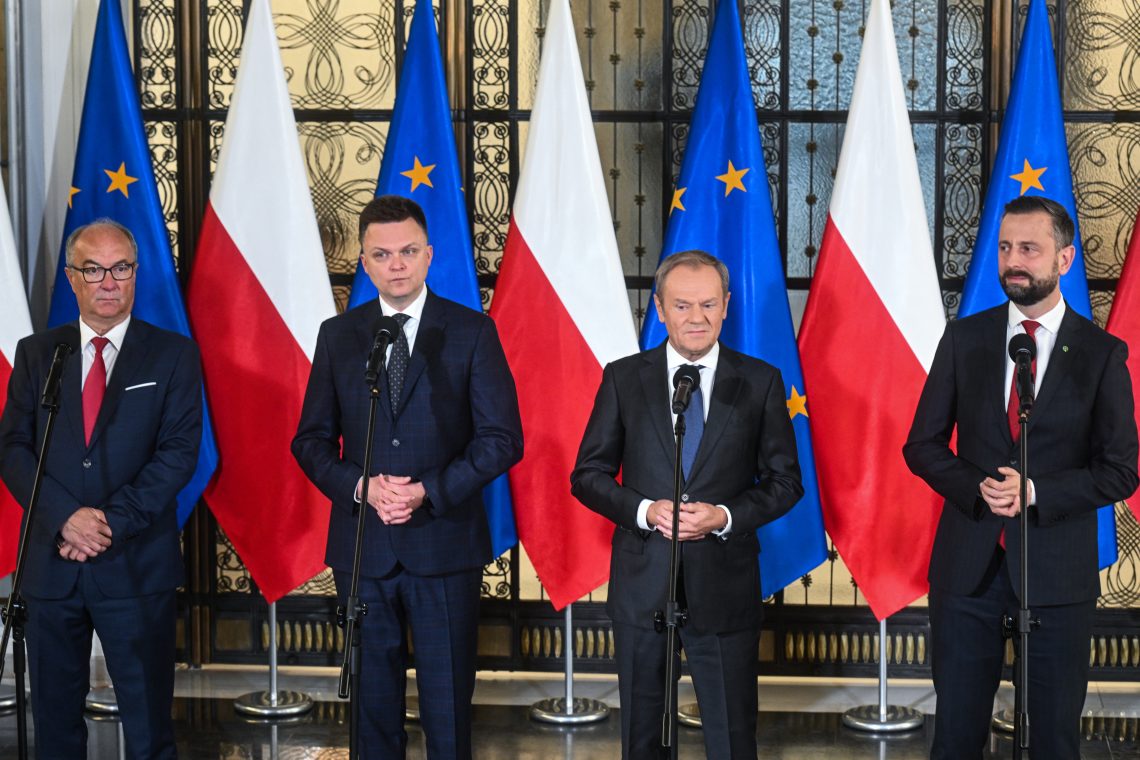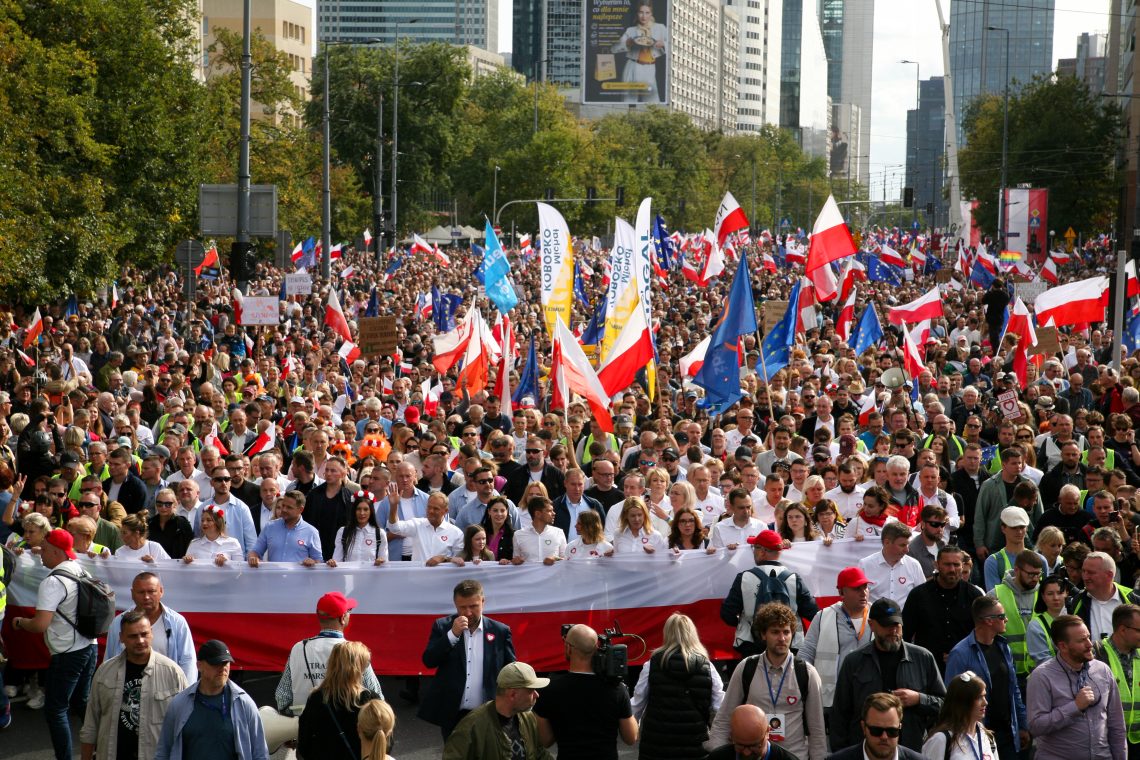What to expect from Poland’s next government
A center-left ruling team is about to replace a conservative one in Warsaw. Expect improved relations with Brussels and Berlin and shifts in many current policies.

In a nutshell
- The center-left won a referendum on the government, aided by a liberalizing society
- Cohabitation with a conservative president will complicate government priorities
- Expect more focus on the European dimension of Poland’s Euroatlantic policies
With the next Polish government presumed to take office by mid-December, it is instructive to step back and digest the consequences of the October 15 parliamentary elections for Poland’s domestic and foreign policies.
A predictable upset
Despite often apocalyptic forecasts, the outcome largely tracked preelection polling and produced few major surprises. The results are well known: the opposition alliance consisting of nearly a dozen parties that formed the Civic Coalition blocs – Koalicja Obywatelska, or KO), Third Way (Trzecia Droga) and New Left (Nowa Lewica) – won 248 of the 460 seats (54 percent) in the Sejm, Poland’s parliament, securing a clear popular mandate to form a center-left government.
The incumbent conservative United Right (Zjednoczona Prawica) coalition wound up with 194 seats. The bloc’s leader, Law and Justice (Prawo i Sprawiedliwosc, or PiS), won the popular vote with 35.4 percent. The KO came in second with 30.7 percent. The centrist Third Way (14.4 percent) produced the biggest surprise, gathering 22 more seats than polls had suggested. The left side of the political spectrum performed worse than expected (8.6 percent) but returns to government with 48 seats after 18 years in opposition.
The far-right, pro-Russian Confederation (Konfederacja) fared worse than predicted, receiving 7.6 percent, but returned to the Sejm with 11 seats. The opposition coalition increased its control over the 100-member Senate from 51 to 65 and will dominate both houses.
After eight years in opposition and six consecutive electoral defeats, PiS’s rivals captured the zeitgeist. They offered voters a pragmatic, center-left program to replace the PiS governing agenda that many considered divisive and backward-looking. The opposition parties gained additional support by promising prior to the election that they would join forces to form a coalition if given a majority, sending a clear signal that those who wanted change would have an alternative. Voters also heeded opposition pleas not to answer four referendum questions it described as manipulative. At 41 percent, the referendum turnout was well shy of the 50 percent threshold to be valid. Nevertheless, more than 90 percent of those who did participate in the referendum voted with PiS.
Exaggerated fears
The election demonstrated that Poland’s democracy, contrary to frequently raised alarms, had not been damaged beyond repair. There have been issues surrounding the independence of the judiciary, corruption, cronyism and strong pro-government coverage in state-run media. And like many governing parties, PiS used its incumbency to its advantage during the election campaign.
Opposition parties were well-organized, civil society organizations were vibrant and active and the media was boisterous and diverse.
However, the electoral process and outcome would have been different had the state apparatus been “captured” or “authoritarian,” as some critics maintained. Poland is hardly an autocracy. Virtually every election in Poland since the collapse of communism has been branded domestically and abroad as “the most important since 1989,” and hyperbole was widespread this time as well.
Opposition parties were well-organized, civil society organizations were vibrant and active and the media was boisterous and diverse, even as the public broadcaster engaged heavily on behalf of PiS. The vigorous campaign and orderly conduct of the elections themselves, as well as the extraordinary voter turnout of over 74 percent – more even than in 1989 when communism had collapsed – demonstrated yet again that democracy is deeply embedded in Polish political culture, indeed in its citizens’ DNA, which dispassionate observers knew all along.
Poland is becoming more liberal
There were many signs that the United Right’s fortunes were declining and its days in office numbered. PiS was reelected in 2019 with a respectable mandate but began to lose support soon after the Constitutional Tribunal, controlled by PiS loyalists, issued a near-total ban on legal abortion in 2020. This decision was deeply unpopular among critical demographics. Female, young, first-time and centrist voters punished PiS for it, turning out in exceptionally large numbers and voting for change.
Dissatisfaction with PiS also grew over its disputes with Brussels, which caused the European Commission to withhold some 36 billion euros from the Covid-related Recovery and Resilience Facility since 2020 and another 76 billion euros in cohesion funds for 2021-2027 in connection with concerns over judicial independence and the rule of law.
Poland is secularizing. Approval of same-sex relationships has grown, while the number of church-going Poles who identify as Roman Catholics fell by 6.6 million between 1992 and 2022, or 19 percent. According to the Institute for Catholic Church Statistics, 28.3 percent of adults attended mass in 2021, down from 36.9 percent in 2019. In 2011, the number stood at 40 percent; in 2001, at 46.8 percent; in 1991, at 47.6 percent; and in 1981, at 52.7 percent. Among those aged 18-24, religious practice fell from 69 percent in 1992 to just 23 percent in 2021. Young Poles have been especially active in anti-church protests. An IBRiS poll found in 2020 that only 9 percent of those aged 18-29 held a positive view of the Roman Catholic Church. These generational changes reduced structural support for PiS, even in core constituencies, and for its social policies.
The opposition coalition’s clear majority in both chambers has the potential to ensure a relatively smooth legislative process, even if it consists of unusual bedfellows.
The election was also a referendum on another term for PiS, and a clear majority voted for the alternatives, choosing to look forward to a more pro-EU future and to set aside old internecine wars in the post-Solidarity camp, as symbolized by the decades-long feud between PiS leader Jaroslaw Kaczynski and Civic Platform prime minister-designate Donald Tusk. Local government elections in the spring of 2024 and for the European Parliament in June will provide further indications of how significant these societal changes are and how the new government is faring.

These societal trends were fertile ground on which the opposition in June mobilized hundreds of thousands of Poles across the country for perhaps the largest anti-government demonstration since 1989. Shortly later, the media reported that a senior Foreign Ministry PiS appointee was implicated in selling large numbers of visas to Asian and African trafficking rings. Then, five days before the balloting, two senior military commanders resigned, raising questions about politicization of the armed forces.
Diaspora voters registered in unusually large numbers (some 600,000), and voter registration within Poland but outside places of residence was four times that of 2019. Polls showed for months that PiS would not be able to form a government alone, and potential partners were not assured. Unsurprisingly, turnout was so high, and it did not favor PiS.
Cohabitation will slow domestic changes
The opposition coalition’s clear majority in both chambers has the potential to ensure a relatively smooth legislative process, even if the bloc may be unwieldy and consists of unusual bedfellows. However, Prime Minister-designate Tusk will cohabit for the next two years with President Andrzej Duda, who, with few exceptions, has supported PiS and can be expected to veto legislation PiS opposes. The next government will not have enough votes to overturn his vetoes, as PiS has a blocking minority in the Sejm. Unless the PiS-led conservatives split, this cohabitation will make it more difficult for the new government to execute its legislative priorities and will slow the fulfillment of its agenda.
Read more on Central Europe’s issues
Cold war between Visegrad and Brussels
The ebb and flow of the Three Seas Initiative
Some of the domestic policy changes the opposition has promised will be relatively easy to push through, but others will be difficult. A removal of PiS appointees from supervisory boards of state-owned firms and state-run radio and television belong to the first category; new governments have done such things routinely in the past. Also, replacing political appointees in ministries is unlikely to require much time. However, President Duda retains influence over ambassadorial and senior military appointments, and there are hurdles to replacing the heads of vital constitutional institutions, like the National Bank of Poland. Its head Adam Glapinski, a PiS loyalist, began his second six-year term in 2022; the opposition considers him illegally reappointed.
Campaign rhetoric emanating from both sides was poisonous, which will make it difficult for the new government to build a broad consensus on its priorities.
Judicial reforms may also take time. The incoming government will have to guard against charges of interfering in the judiciary. It is not clear how the dozens of judges in various bodies, including the Constitutional Court, will be replaced. It will take time to reform the entities considered politicized and to close the court’s controversial disciplinary chamber. All this may affect Mr. Tusk’s timeline and delay resolving cases the EC filed against Poland in the Court of Justice of the European Union, on which the full transfer of EU funds depends.
A divided country
The new government must contend with the extensive reservoir of popular support for conservative policies in the country. While opposition candidates for the Sejm won some 12 million votes, more than 12 million Poles also voted in the referendum the opposition boycotted. This split will complicate the incoming government’s actions on divisive cultural issues, like the abortion law its left-wing partners seek to liberalize.
Polish society remains deeply divided divided between conservative and centrist/center-left, pro-EU parties. Leaders of both camps consider each other threats to the nation. Opposition leaders will not quickly forget being labeled “stooges of Russia and Germany” and “traitors” who must be excluded from the political scene. PiS leaders will long remember being denounced as evil threats to Polish families and Poland’s place in Europe. Since October 15, both camps have continued their sharp political rhetoric, indicating the intention to pursue quite different visions of Poland’s future. The opposition coalition’s pledge to prosecute anyone for breaking the Constitution and the rule of law, if carried out, would exacerbate the divide further, as it could bring senior PiS politicians before the courts for actions that may not necessarily, legally speaking, be crimes. Campaign rhetoric emanating from both sides was poisonous, which will make it difficult for the new government to build a broad consensus on its priorities.
Scenarios
More ‘Euro’ focus in ‘Atlanticist’ foreign policy
Opposition leaders have repeatedly stressed their intent to fix Poland’s relations with the European Union and end tensions over sovereignty and some domestic policies. Mr. Tusk’s trip to Brussels days after the election assured officials there that he would end these tensions. Tusk also intends for Poland to play a leadership role in the EU in keeping with the country’s importance. The former president of the European Council (2014-2019) will bring exceptional experience and influence on EU issues to the role of prime minister; Poland could be a significant player at that level again. This will increase the EU role in Poland.
Mr. Tusk has placed a very high priority on the transfer of funds the EC has held back for rule-of-law reasons, not only to bolster Poland’s strained public finances, and he has already obtained a green light for an initial tranche of more than five billion euros. Meanwhile, the next government will inherit an economy that has grown faster and more consistently than any other EU member state in recent decades.
We can also expect much more focus on EU-level solutions, including Poland’s approval of controversial measures such as The New Pact on Migration and Asylum and support for the Common Foreign and Security Policy, the latter not only as a hedge against political developments in the United States. Western European leaders, however, are unlikely to welcome power gravitating eastward, even if German Chancellor Olaf Scholz noted in an August 2022 speech in Prague that the center of Europe has been moving in that direction. Idle talk of “Polexit” will cease. This greater focus on EU priorities will mean less focal point on Washington.
Making nice with Berlin
Berlin could not be more pleased with the election outcome, which former German ambassador to Poland Rolf Nikel called a “spring in the middle of October.” The new government will move quickly to reverse the negative state of bilateral political relations, and Germany will become a key partner again rather than a domestic political issue. The incoming government is unlikely to press the 1.3 trillion euro reparations claim PiS has promoted, even if Mr. Tusk’s party in September 2022 supported a parliamentary resolution on it. Berlin may revive the Weimar Triangle, but it has never treated Poland as an equal, like France, as that format suggests. The new government will be looking for signs that Berlin plans to deal with Warsaw as a full equal – “auf Augenhoehe” or “at eye level,” as Germans often put it – and moves in Poland’s direction on some of its priorities. A large percentage of Poles remains skeptical that Germany has fully internalized the Zeitenwende (turning point) policy change Chancellor Scholz announced after the Russian reinvasion of Ukraine jolted German political elites out of decades of pursuing a rosy-eyed, naive, Russia-first policy. The new government will expect Berlin to keep up its solidarity with Kyiv, not seek to return to business as usual with Russia and live up to its Wales Pledge.
Minor corrections in the relationship with Washington
As Warsaw fixes its ties with Europe and Germany, Washington will have to contend with Brussels and Berlin’s increased influence on Poland’s foreign policy and defense priorities. That said, the U.S.-Polish relationship will remain robust. With some 10,000 American troops and critical defense systems deployed rotationally in Poland, security, commercial and person-to-person ties will stay exceptionally strong.
However, expect the new government to review defense contracts, especially those for which there are no binding agreements, and possibly nuclear power cooperation, which does not excite Berlin and which Paris may seek to revise to benefit its civilian nuclear industry. Warsaw may modify or cancel some deals, switch to EU suppliers or split them between U.S. and European firms, as Mr. Tusk did when he was last in power (2007-2014). Some observers express concern the new government may seek to revise sensible policies just because PiS is associated with them. On the other hand, there may well be synergies and other benefits for Atlanticist and NATO goals from having Poland more active at the EU top table.
Busy on the eastern flank
The new government will not change its support for Ukraine, which enjoys broad societal consensus, and will continue to be a significant provider of humanitarian, logistical and military aid. However, the two agrarian parties in the opposition coalition, the Polish People’s Party (PSL) and AGROunion, can be expected to take tough stands on Ukrainian agricultural exports, and the new government will have difficulty ignoring domestic groups like truckers who have been causing huge backups at the Ukrainian border. The incoming government will also face the major and thorny issue of Ukraine’s membership in the EU; its views on the details of that process are not yet known. Poland’s move into the EU mainstream will not increase its influence in the Visegrad 4. Its split into Polish-Czech and Hungarian-Slovak camps will now become deeper and leave it even weaker. Warsaw may also focus more on its Baltic flank and court Scandinavia, partially because not every Central European country welcomes Polish leadership.
Focus on domestic matters first
All indications are that Poland will have its new government by mid-December, as per the timeline set forth in its constitution. Fears that PiS could manipulate the new Sejm to prevent the opposition from assuming power or block the passage of a budget to provoke another election in the first half of 2024 seem overblown.
However, President Duda has a prominent constitutionally-prescribed role in the transition and is making full use of its possibilities, even as critics consider them unconstructive or “political theater.” PiS leaders are aware that any divergence from the timeline would arouse widespread protests, not to mention pressure from the EU and other partners.
The incoming government is likely to devote particular attention in its first year to domestic affairs, given the number and complexity of policies it has pledged to modify. The EC and Mr. Tusk are both eager to demonstrate to Polish voters that pro-EU policies generate more benefits for citizens than the EU-skeptical policies PiS pursued, which increases incentives on both sides to bring about the release of the withheld funds quickly.
Changes in foreign policy will be less immediately tangible for citizens. However, these will also be the incoming government’s priority, as a strong EU focus remains central to its identity.
For industry-specific scenarios and bespoke geopolitical intelligence, contact us and we will provide you with more information about our advisory services.










